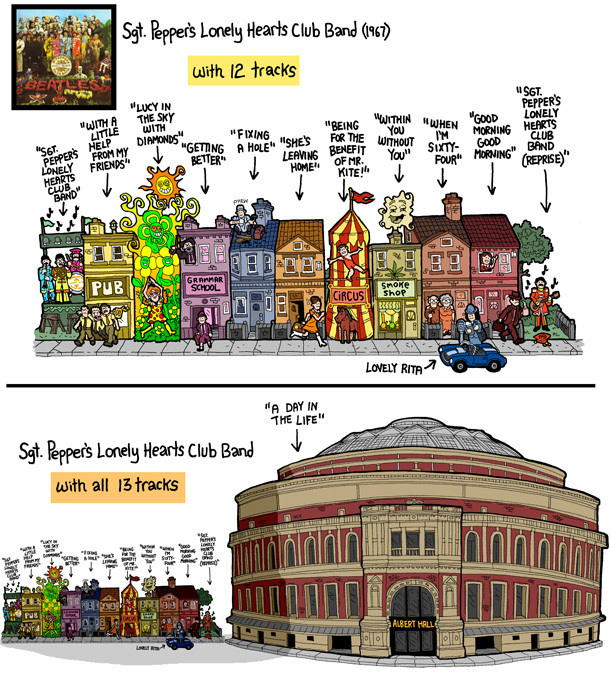The 5 Worst Kinds of Album Every Music Fan Has Bought

An album is like a pizza, and as much as I like to buy single slices now and then, I really feel that it's the full pizza that represents the best dining experience. You lift the lid on a little square box and therein lies a disc divided into 10 or so segments, and what you want is for all those segments to taste the same (though inevitably even the best pizza has that one slice where the dough formed a huge bubble and everybody keeps passing over it in hopes it'll somehow go away). And so it is with albums, too.

But sometimes you open that box and the disc inside just isn't what you ordered, and you didn't think they could find a way to ruin such a nominally straightforward experience, but goddammit, you were wrong. Few things are as outright sad and bemusing as a bad pizza (if you don't know what I mean, just go to Domino's and ask for THE ANYTHING), but a bad album certainly is, and here's a list of some of the worst kinds and why they're bad.
The Urban Sombrero
There's an episode of Seinfeld where a character's hubris results in the marketing of a hideously ill-conceived article of clothing that she can't see is the worst idea ever until it's too late. This article of clothing is the urban sombrero, and it's my go-to metaphor for the inevitably terrible result of assuming you can do no wrong. And much like blind self-belief results in terrible metaphorical hats, it also results in terrible art (I will type "George Lucas" and you will finish the thought), and many terrible albums.

An urban sombrero album is sometimes a band's first release following their overnight success. After years of drudgery, their second album managed to fulfill some kind of cultural need, and it took off into the stratosphere -- taking with it their sense of validation. Suddenly it's been 18 months since anybody had the balls to say no to them, and into this echo chamber comes the call to get working on the next album. The members of the band gradually arrive at the studio, all in separate vehicles now, and eventually an album begins to emerge, and the band thinks it's great and the engineer says it's great and the producer says it's great and the label guys say it's great and the early reviews say it's great and the message boards say it's great because everyone wants it to be great. But slowly they realize it's not great -- it's a great big Mexican hat.

It's soulless and uninspired, it's the musical equivalent of latter-day James Cameron or Stephen King, it's cocaine literally pressed into the shape of discs and accompanied by liner notes and Johnny Depp on slide guitar. It's what happens when you think you're successful because of who you are rather than what you've made, and thus you don't need editors because whatever you make will be brilliant. Hopefully making a real sombrero of an album will drag you back to earth in time to save your integrity (OR NOT).
The Bait and Switch
This is when an album might be brilliant in its own right but is ruined for you by expectations -- typically via a lead single and/or video that's misleadingly different from everything else on the album. It's not that they're bad songs, it's that you were understandably expecting one thing but then got the opposite, and thus it's one of the worst kinds of album.

The other side of this is the Reverse Bait and Switch, where you miss out on something good because the packaging is so lame. Let's just say you'd have a wider variety of albums if entire genres of talent weren't so often undermined by asinine marketing -- soullessly polished videos and album cover photos that Cosmopolitan would reject as too Photoshopped. Such visual autotune gives little but the false impression that an album lacks depth when it seldom actually does (even the most airbrushed top 40 singers have amazing session musicians all over their records). Worthless douche-rock albums from the dregs of musical society should be the ones with imbecilic glamour shots of the lead singer's face on the cover, thus scaring off small children and anyone rightly expecting a terrible album.

The Greatest Hits
But how can an album of someone's best songs be bad? Because it's the same as a pizza where every slice has a different topping -- great in theory, but then you have one slice and you want more of that flavor, but no, fuck you, it's on to the next flavor, and moreover pesto just tastes off after a mouthful of pineapple. The greatest hits were much better on the original album when they were perfectly complemented by the songs before and after.

It's the same way you counterintuitively don't get a wonderful dinner by getting out the blender and combining unrelated ingredients that you like individually (I HAVE RUN THE TESTS), or how you don't get a beautiful city by insanely putting random buildings next to each other (stop by Toronto sometime if you don't believe me -- it is the greatest hits of cities). Sticking all the hits together and pressing play just gets you jarring incongruity. Traditionally bands have slaved over putting together a set of songs that flows together properly, sometimes leaving great songs off albums because they don't fit, and this is exactly why. Combine that with the fact that the "Best Of" album is guaranteed to not have your favorite song on it (not everyone knows it, that's why it's your favorite) and you've got yourself one of the worst kinds of album. Although it's still not as bad as ...
The Album With One or Two Disproportionately Good Songs
Entire careers, and in fact genres, have been sustained by albums where no one song ever really stands out over the others (see: literally everything except mainstream pop/rock), so it's not a lack of hits that makes for a bad album. It is, ironically, when you stick a real classic in there among regular tracks that throws everything off. Everything is relative, and when every song on an album is roughly equal, then you've got yourself a decent album. When every song is decent except for Track 1, the culture-straddling megahit, then you've got yourself a severe perception issue. Everyone was cool with the pizza you ordered, but when you open the box, there's for some reason one slice in there from the gourmet place uptown, and now it's one-tenth of a good pizza instead of a nice dinner. It doesn't actually suck, but perception-wise it's completely diminished. You don't know what you've not got 'til it's here.

An extreme enough instance can even poison a band's entire catalog, leaving them wrongly perceived as a "one-hit wonder" instead of a reliable and consistent act (the difference between Billy Bragg and Chumbawamba is "Tubthumping"). Of course, if you can manage to relentlessly crank out an endless string of terrible albums with two good songs on each of them, those songs will add up and net you a lucrative career, but not everyone's in love with money to that extent.
The Dreaded 3 Stars Out of 5
Much like the worst direction you can go in is no direction, so is inoffensiveness worse than taking a stand, and thus the boring album is in a way worse than even a terrible album. An album that is full-on awful will always get minimal scores, but an album that is accomplished but boring is going to attract the dreaded three-star review -- so often the calling card of the most inessential music of all (if your album is best described as "pleasant" then you're in serious trouble). A one-star album can't be boring, because even if the music is godawful, it's WHY it's awful that is itself entertaining -- a one-star review is inherently entertainment, which is why you'll always read one when you're skimming the reviews column. But who the hell wants to read the three-star reviews, particularly as they're all identical ("IT'S NOT TERRIBLE, BUT IT'S LACKING. IT FALLS SHORT, BUT IS A STEP IN THE RIGHT DIRECTION"). And boring as fuck.

The opposite of enjoyment is not disgust; it's tedium, because in a life so cruelly short, there's nothing worse than being forgettable. The most disgusting pizza I've ever had was the one that accidentally had dish soap in it (SECRET FAMILY RECIPE), yet of all the ones I've eaten, it alone has survived the years as an amusing anecdote. It's the middling three-star stuff you won't remember. The albums from artists you respect that you've had forever but played once (REM are like your parents -- you know they're good, but you never listen to them). A reworking of ratings systems might help, but if we've gone this far without rating entertainment based on how entertaining it is, then why start now? The accepted method of rating albums isn't terrible, of course, it's just lacking. It falls short, but it's a step in the right direction. I'd give it ... 3 stars out of 5, let's say.